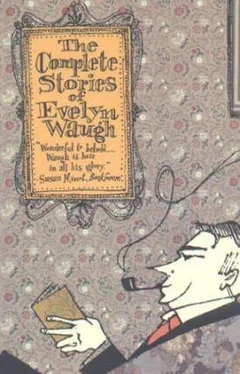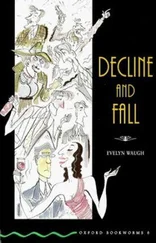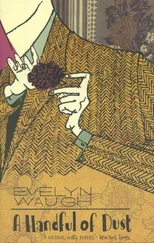Evelyn Waugh - The Complete Stories Of Evelyn Waugh
Здесь есть возможность читать онлайн «Evelyn Waugh - The Complete Stories Of Evelyn Waugh» весь текст электронной книги совершенно бесплатно (целиком полную версию без сокращений). В некоторых случаях можно слушать аудио, скачать через торрент в формате fb2 и присутствует краткое содержание. Год выпуска: 1998, ISBN: 1998, Жанр: Классическая проза, на английском языке. Описание произведения, (предисловие) а так же отзывы посетителей доступны на портале библиотеки ЛибКат.
- Название:The Complete Stories Of Evelyn Waugh
- Автор:
- Жанр:
- Год:1998
- ISBN:0-316-92546-2
- Рейтинг книги:3 / 5. Голосов: 1
-
Избранное:Добавить в избранное
- Отзывы:
-
Ваша оценка:
- 60
- 1
- 2
- 3
- 4
- 5
The Complete Stories Of Evelyn Waugh: краткое содержание, описание и аннотация
Предлагаем к чтению аннотацию, описание, краткое содержание или предисловие (зависит от того, что написал сам автор книги «The Complete Stories Of Evelyn Waugh»). Если вы не нашли необходимую информацию о книге — напишите в комментариях, мы постараемся отыскать её.
The Complete Stories Of Evelyn Waugh — читать онлайн бесплатно полную книгу (весь текст) целиком
Ниже представлен текст книги, разбитый по страницам. Система сохранения места последней прочитанной страницы, позволяет с удобством читать онлайн бесплатно книгу «The Complete Stories Of Evelyn Waugh», без необходимости каждый раз заново искать на чём Вы остановились. Поставьте закладку, и сможете в любой момент перейти на страницу, на которой закончили чтение.
Интервал:
Закладка:
Everyone in College had heard the story next morning. It reached me through my scout who called me with: “Half-past-seven sir, and Lord Poxe has murdered Mr. Curtis.” I met Poxe in the bathroom, very white and dejected. I asked him about the murder.
“Well, I suppose I’ve rather rotted things up this time. I can’t remember a thing about it except that I was furious about some grass, and that two people put me to bed. It’s a melancholy business. They can’t hang me, can they?”
I suggested inebriates’ asylum and had my bath. I was sincerely sorry about poor Poxe, but felt he would probably be better shut up. After all it was not safe to have a man who did that sort of thing about the College; it was not as though he was seldom drunk. I went to breakfast at the Old Oak tea rooms and found Edward there. He was in great form, and for this I disliked him that he should be in good form at breakfast; however, he was really rather amusing about the Poxe murder as it was already called.
Edward asked if he might work in my rooms—he knew I never used them—as he had had a fire in his. I said that I wanted them this morning and advised the Union. Then I went back.
At about eleven, I saw from my window the Warden’s side door open and Poxe come out, radiantly cheerful. I called him into my room, and he told me of what had happened. It must certainly have been a cheering interview for Poxe.
He had gone to see the Warden with all the trepidation that should befit a young nobleman suddenly confronted with the prospect of being hanged. The old man had been seated on one side of the table with the Dean next to him. Poxe had been asked to sit down. The Warden had begun:
“I have asked you to come and see me, Lord Poxe, in what for both of us, I think, and certainly for me, is a very bitter occasion. Last night, when in a state of intoxication, as you will perhaps have been informed, you entered the room of your tutor, Mr. Curtis, and stabbed him to death. I suppose that you do not deny this?”
Poxe was silent.
“It was a foolish act, Lord Poxe, an act of wanton foolishness, but I do not wish to be hard on you,” the Warden’s voice broke with emotion, “my poor boy, you are the fifteenth Lord Poxe and, as I have at different occasions reminded you, not unconnected with my own family. Lady Emily Crane, your great aunt, you will remember, married a Mr. Arthur Thorn, my grandfather. I feel that the College owes it to your position to treat this matter as discreetly as possible.”
Poxe nodded enthusiastically. Among tradesmen and dons he had always found his title of vast value.
“The Dean and I have discussed the matter at some length and have come to the conclusion that there is no reason why this matter should be referred to the ordinary State authorities at all; it has, as, of course, you are aware, always been a principle of University government so far as is possible to impede and nullify the workings of the ordinary courts of law. In this case it seems particularly advisable, as it is only too likely that the criminal courts would be unwilling to treat this matter with the clemency which we think desirable.
“Nor, indeed, is a precedent far to seek. In the fifteenth century a commoner of this College struck off the head of the Bursar—true, that was in open fight and not before the young man had received severe injuries; but things, of course, were far rougher then. On that occasion the distinguished scholar, who held the position it is my privilege unworthily to occupy, inflicted upon the delinquent the fine of twopence to be paid to the Bursar’s relatives.”
Poxe brightened.
“Of course, the value of the penny has, since that time, markedly decreased, but calculating it as nearly as one can in days of rather haphazard accountancy, the Dean and I decided that the fine must have valued about thirteen shillings.
“I need hardly say, Lord Poxe, that this whole matter has been acutely distressing to the Dean and myself. We hope and trust that it will not occur again. It is probable that in the event of a second offence, the College would find itself unable to treat the matter with the same generosity. Thank you, Lord Poxe.”
And thus the interview closed and Poxe went out, elated, to celebrate his escape in the manner which most immediately suggested itself to him; and Edward, in his fire-blackened room, felt that everything was turning out well.
Without difficulty, an aged and dissolute doctor was unearthed in St. Ebbs, where he lodged in squalor with one of the College servants, and earned an irregular livelihood by performing operations in North Oxford; this sorry man was persuaded to write a certificate of death from natural causes. The funeral was brief and ill attended. The Warden toiled for three days in the composition of a Greek epitaph and on the third evening persuaded the Dean to write one in Latin. And so for Poxe and Edward the matter ended.
One thing I feel should be added. It is merely an incident that may be of no significance but which may explain much that seems improbable. I was told it in an intimate moment by Anne, who is married to the Warden, and of whom many stories are told. This is what she said, that on the night when Mr. Curtis died, she ran in a high state of emotion to her husband, the Warden, and cried, “Oh why, why did you kill him? I never really loved him.”
She stopped, seeing the Dean there also. He, a gentleman, rose to go, but the Warden detained him. And then Anne, falling on her knees, pounded out a tale of the most monstrous and unsuspected transactions between herself and Mr. Curtis.
“Supposing there were a trial,” asked the Warden, “could this be kept a secret?”
The Dean doubted gravely whether this would be possible.
And then came to the Warden the full realization of the imperishable obligations of precedent, the memory of the head of the Bursar, the appreciation of the greatness of families not unconnected with his own.
“At least, I think it must have been then,” Anne said as she turned up the light.
FRAGMENTS: THEY DINE WITH THE PAST
Almost the first thing which Toby said to me when we met was, “Imogen is in London again.”
Even to Toby to whom this could never mean as much as to the rest of us, it seemed the only thing of immediate importance; to me, more than as pleasure or pain, though, of course, it was both of these, it came as a breaking away of near memories.
For some moment of time the bar where we stood was frozen in space; the handles, the slopped wood, the pallid man beyond them lost perspective; “If you like our beer tell your friends; if you don’t tell us” stood as cut in stone, the ordainment of priest kings, immeasurably long ago; the three years or a little more that stood between now and that grim evening in April fell, unhonoured, into the remote past and there was no sound from the street.
Then, instantly almost, the machine fell to its work again and I said as though nothing had intervened between his voice and mine:
“Was she with him? ”
For even now, after three years or more, I could not easily say his name; I spoke of him, as slatternly servants will speak of their master, impersonally. And indeed it was thus I thought of him; the name was an insignificant thing labelling an event. Toby understood something of this as anyone who had known Imogen, must have understood, even he; for he was associated with much that was wholly alien to him; he had been in Adelphi Terrace in that strange evening in April when Hauban had gazed out across the river for two, three hours, and scarcely a word spoken.
To my question, down such valleys of thought, his answer made a way; she had been with him; they in a taxi; Toby had seen it from the top of a bus in Regent Street.
Читать дальшеИнтервал:
Закладка:
Похожие книги на «The Complete Stories Of Evelyn Waugh»
Представляем Вашему вниманию похожие книги на «The Complete Stories Of Evelyn Waugh» списком для выбора. Мы отобрали схожую по названию и смыслу литературу в надежде предоставить читателям больше вариантов отыскать новые, интересные, ещё непрочитанные произведения.
Обсуждение, отзывы о книге «The Complete Stories Of Evelyn Waugh» и просто собственные мнения читателей. Оставьте ваши комментарии, напишите, что Вы думаете о произведении, его смысле или главных героях. Укажите что конкретно понравилось, а что нет, и почему Вы так считаете.












